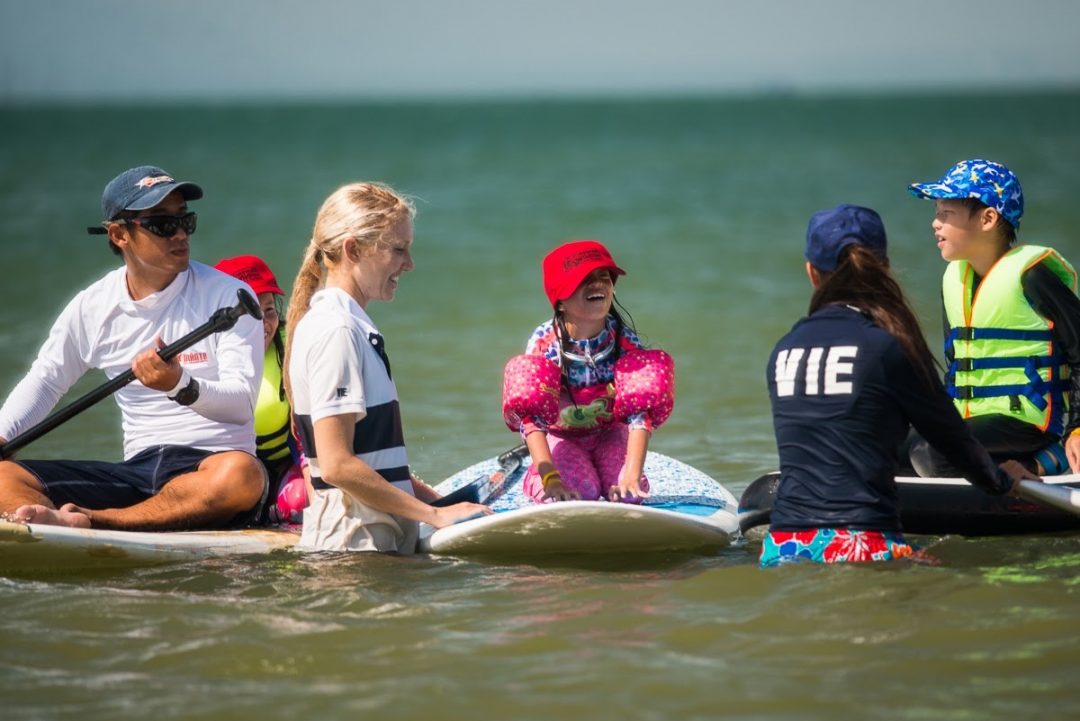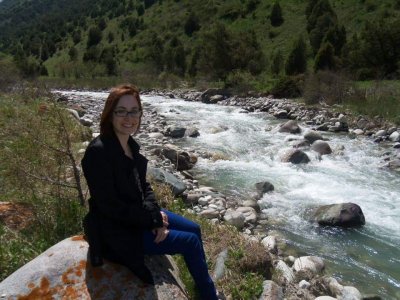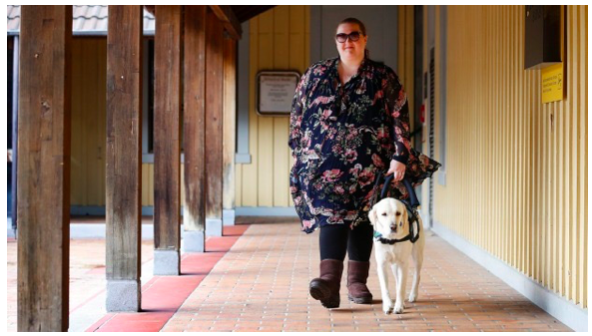Exploring the Extraordinary in Your Ordinary
May 29, 2020By Emi Koch, Fulbright-National Geographic Storytelling Fellow to Vietnam, 2019-2020
My dad almost spit out his morning coffee. Puzzled, he cleared his throat.
“Em, are you… sure?”
It was June of last year and I was only thinking to apply for a Fulbright.
“It’s just a thought! I’m just looking into it.”
My words rushed together, the way they do when I get overly excited — which happens a lot. I have ADHD.
He cautiously took a second sip of coffee.
“I mean — isn’t a Fulbright really competitive? Like for people who… you know?“
I knew who he meant. The smart people. Valedictorians. Meredith, who took AP Physics in high school.
Acknowledging his question, I glanced back at my laptop with the Getting Started page on the Fulbright Student Program website staring brightly back at me. The thought that the U.S. State Department would pay me — me! — to travel to a foreign country and devote nine months of my life to collaborating with local residents with a shared curiosity for actionable, positive change seemed beyond my wildest dreams. But the only thing that seemed more impossible than me winning a Fulbright, was me not applying.
I knew my dad’s apprehension was well-informed by my past struggles and letdowns involving my grades, where I had to prove to others that I was capable and yes, even smart…just not in the conventional way.
A few years ago, I was diagnosed with Dyslexia (a learning disability in reading), Dyscalculia (a learning disability in math), and Attention Deficit Hyperactivity Disorder (ADHD) that comes with a mean stutter when public speaking. I was a sophomore in college, and up until that point in my life, I had simply believed that I was slow.
The first time I noticed it, I was five. While I was surrounded by my classmates stretching their hands high up in the air and shouting, “Me! ME!” so that the teacher might call on them first to reveal the coveted, correct answer to the subtraction problem, my hands were clenched tightly around the desk as if we were all about to blast off into the deep, dark unknown forever. I had no idea what was going on… only that so much was going on. Contrary to popular belief, people with ADHD don’t have trouble concentrating. We simply concentrate on everything all at once. The math problem, the other students, the staple shining on the floor and that weird pencil mark on the desk that looks like an acorn are all equally begging for our attention.
In school, this restlessness and attention to peripheral details presented a huge challenge that often resulted in poor grades, dismal SAT scores, and low self-esteem. Surfing was my escape. Sliding down the face of a wave, I knew exactly where I was — physically, mentally, and yes, even spiritually. Unlike the classroom, the ocean was this dynamic force that required my absolute, divided attention — to everything all at once. For the first time, my disabilities were capabilities; misfits that found themselves useful. Mystifying still, the ocean was what ultimately ushered me back into the classroom.
I’m a social-ecologist, meaning I study the relationships people have with our built and natural environment. My focus is on the world’s millions of miles of coastlines and the many isolated, marginalized fishing communities that depend on ever-depleting marine resources. I’ve come to realize that my disabilities are like superpowers — if harnessed properly, they enable me to explore nuances — whether of a physical space, a word in a foreign language, or a feedback loop in a marine social-ecological system. These overlooked subtleties are where the problems hide… those details researchers seek in order to solve problems. In that ability to spot those details lies the ability to find the extraordinary in the ordinary.
Almost one year after being awarded a Fulbright-National Geographic Storytelling Fellowship to Vietnam, I’m still pinching myself that it really happened. My dad spit out his coffee for a second time when I told him the remarkable news.
Before I arrived, people described Vietnam to me as overwhelming. If by that they meant overwhelmingly beautiful, industrialized, and karaoke-curious, I understand. During my time there, I immersed myself in a small-scale fishing community with a rapidly-developing tourism scene and rising sea level just north of Ho Chi Minh City. I lived in the back of a water sports center called MANTA. MANTA trains fishermen to become certified sailing instructors so that they can teach tourists how to sail, and how to use the power of wind energy as an alternative to fossil fuels. MANTA also provides fishermen with an alternative source of income, though this doesn’t mean that the fishermen stop fishing – that’s in their blood.
Since I lived inside a water sports center, I was fortunate to have stand-up paddle boards at my disposal. They were my go-to mode of transportation and earned me credibility among the fishermen for maneuvering my own water craft. I paddled out to sea and met them at their boats for interviews. Sometimes, they invited me on board for breakfast, and we would help ourselves to buckets of freshly-caught soft shell blue crabs, cracking open the not-so-soft shells with our teeth and slurping up the honeyed insides.
In my research, I listened to fishermen’s stories and explored the social and ecological impacts of low fish availability on the human security of ocean-dependent villages along the East Sea. Back on land, my colleagues included several children, ages four to sixteen — the sons and daughters of local fishing families. These kids accompanied me with waterproof cameras to document their lives. Despite the innumerable dissimilarities between my childhood and their own, I can’t help but identify with some aspects. These kids are smart. They are resourceful. I think they’re incredible. But many of them have been told they are not something enough to be successful, or they are too something to have real authority.
I wanted to wash all that social conditioning from their minds and tell them they are powerful. You, kid, are the superhero of your own life story. Our disadvantages, disabilities, discriminations, and disappointments do not define us, because we have the human right to make up our own definitions.
My research team and I explored the extraordinary in the ordinary. They helped me capture nuances in their images that are often unaccounted for in academic papers and news stories. As one fisherman said, the projects we did together were an opportunity for everyone to “big themselves up”… and that’s what Fulbright has meant for me.
Celebrating the ADA’s 30th Anniversary: Q&A with Alumni Ambassador Alyssa Meyer
February 20, 2020Thirty years ago, the United States became the first country in the world to adopt national civil rights legislation banning discrimination against disabled people. Since that time, the Americans with Disabilities Act (ADA) has had a profound impact both at home and abroad.
Last month, we launched our yearlong celebration of the ADA’s 30th anniversary, which will include profiles of Fulbright alumni with disabilities. This dynamic group of Fulbrighters will tell stories from their experiences abroad, offer advice to future applicants, and discuss Fulbright’s impact on their careers.
Today’s story comes from Fulbright alumna Alyssa Meyer, a 2012-2013 U.S. Student Researcher in Energy to the Kyrgyz Republic. Meyer spoke with Fulbright on her path to the program, her research, and navigating home and abroad with a disability.
Q&A with Alyssa Meyer
1. Tell us a little about your path to Fulbright. Who or what inspired you to apply?
The prospect of an opportunity like Fulbright had been on my mind for several years before I applied–largely because I wanted to seek out opportunities to use my language skills in native settings. My first exposure to Fulbright was through Fulbright Foreign Language Teaching Assistants, who had come to the States to teach their native languages (Uzbek and Russian) at Michigan State University. My second encounter with Fulbright came the summer after my sophomore year, when I visited Berlin on my way home from a study abroad program in Turkey; there, while watching a soccer match, I met a Fulbrighter who had lost track of whether the announcer was speaking English or German. All I could think was, “Wow, I wish my language proficiency was that strong!”
The next summer, my resident adviser for a study abroad program in Tajikistan was yet another a Fulbrighter, and I was in awe of her ability to communicate in and navigate her host country. Given that I grew up in rural Northern Michigan, I can’t claim to have grown up with examples such as these, but I knew that I wanted to emulate them.
2. Tell us a little about your Fulbright research topic and project. What did a typical day as a Fulbrighter look like for you?
As a research grantee in energy to the Kyrgyz Republic, my project was focused on energy insecurity, and whether small-scale renewables could help bridge gaps in access to heat, electricity, and gas provision. My initial intent was to conduct a benefit-cost analysis in partnership with locals interested in community-level solutions to the country’s energy crisis.
I don’t think I had a typical day; I lived by a mantra to take in everything I could and talk to everyone I could–because I didn’t know whether ever get the same chances a second time. I spent five hours a week with a Russian tutor and interviewed researchers, policymakers, international organizations, and academics doing similar work. I also shared a two-bedroom apartment with a native Russian speaker from Turkmenistan, who remains one of my closest friends and travel partners to this day.
3. What advice would you give to current Fulbrighters in the field about how to get the most out of their Fulbright experience?
Be open to letting your work and your expectations of what you think you’ll accomplish evolve. For me, this happened in the most unexpected of ways: I became quite ill in the middle of my grant, and during a hospital stay, I began to see my own research from a new perspective. I don’t relay this story to wish that experience on anyone, but rather, to say that living in the very conditions I was researching taught me far more than working within a library ever could have.
Even before I got sick, I was vividly aware that my aforementioned benefit-cost analysis was far more complex than I had initially foreseen it to be. It wasn’t overly difficult for me to gain a picture of how many houses lost power in a given outage, but data as to how those outages impacted quality of life was much more complex to come by. And while I was by no means unaware of this, I was unwittingly smacked in the face with it when I experienced a power outage during a hospital visit. Even after I made a full recovery, I continued to be haunted by questions of what would have happened had I been on the operating table or on a ventilator during an outage. Eventually, this new question–the impacts of energy insecurity on quality of life–became not only the topic of my master’s thesis, but of a second grant application to return to the Kyrgyz Republic two years later.
Two years later, as a Boren fellow, the research became even more complex when I realized that what my household data was showing didn’t match the narrative being reported on the news and in political speeches. My point is: setting goals for what you’ll achieve during your Fulbright is an important piece of showing selection committees that you know what you’ll be doing when you land in your host country–but sometimes, it’s the detours you never anticipated that teach you the most.
4. What advice would you give future Fulbrighters on the application process?
Show a desire to engage with your local community. Fulbright isn’t looking for academics who never leave the ivory tower, they’re seeking applicants truly intent on promoting mutual understanding between their home and host countries. That means a willingness to engage with and challenge local stereotypes about you/your home country whenever possible, and to share those experiences when you return home.
5. What might an American/someone from your home country be surprised to hear about your host country/institution/state/etc.?
People often remark that I’ve become much more assertive after several years in the Kyrgyz Republic, but what they don’t understand is why that happened. Want to get off a bus in the Kyrgyz Republic? You’ll need to physically ask the driver to stop. Want to buy nearly anything? You’ll need to ask a seller to retrieve it for you from behind a counter or the inside of a glass case. Want to order or pay a bill in a restaurant? You’ll need to call to your waiter across a crowded restaurant. Want to receive standard medical care? You’ll need to go to a pharmacy and ask for the medicines and supplies you’ll need to purchase/bring with you, and if you can’t find something, you’ll also need to call the doctor to ask about acceptable substitutes.
My oddest “things I would have previously been terrified to do in my native language” story? Calling my veterinarian on her cell phone in the middle of the night to explain that my cat (also a Fulbright alumnus) had been vomiting and had pooped out a needle I wasn’t aware he’d swallowed. (He’s thankfully fine.)
6. What is your biggest takeaway from your Fulbright?
Few things make a person more self-aware than moving abroad alone. And for me, one of the things I’ve become most aware of by moving abroad is how often I’ve taken the Americans with Disabilities Act for granted in the United States. I have mild cerebral palsy, and–after five corrective surgeries–other than a small limp, it doesn’t drastically impact my quality of life…in the United States. I make this qualification because, while I do have worse-than-average balance going down stairs, I don’t often have to think about it in the U.S.–because of ADA requirements for railings on staircases.
Moving to Central Asia alone meant that I very quickly came to terms with the fact that I might fall going down stairs or a sidewalk in the winter (because ice isn’t cleared as readily as it is in the States). Indeed, my own struggles with uneven paths and railing-less staircases in Central Asia has shown me that I was to everything–from ATMs to pharmacies–being accessible via stairs. The years I spent in Central Asia have also shown me that people with disabilities are largely not visible within society–not because they are unable to participate, but rather, because life is just not structured in a means that is accessible for many of them.
This is a realization I do not take lightly. My life is not without its challenges and instances of outright ableism–including those who still challenge my ability to move abroad independently despite a track record of more than four years of working and researching independently in Central Asia. Nevertheless, had I not been born in the United States, it is not lost on me that I may not have been afforded the very opportunities for self-enrichment that have made me the public servant I am today.
Fulbright Celebrates the 27th Anniversary of the Americans with Disabilities Act
July 26, 2017Today, the Fulbright Program wishes the Americans with Disabilities Act a very happy 27th anniversary! Fulbright strives to ensure that its participants reflect the full diversity of U.S. society and societies abroad.
Applicants with disabilities are encouraged to apply and can learn more about resources and opportunities at https://www.eca.state.gov/fulbright.
Please also visit the National Clearinghouse on Disability and Exchange at http://www.miusa.org/ncde, a project sponsored by the U.S. Department of State’s Bureau of Educational and Cultural Affairs and administered by Mobility International USA, for more useful information on applying.



